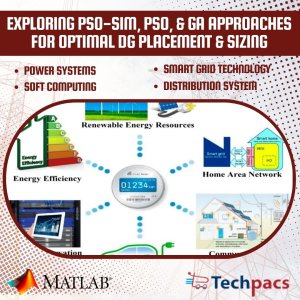Hybrid MPPT Algorithm with PID Controller and GOA Optimization Strategy for Maximizing Solar outputs
Problem Definition
The existing literature in the field of photovoltaic (PV) solar power tracking has seen the development of various algorithms, such as ANFIS MPPT algorithm and whale optimization algorithm with PI controller. While these algorithms have shown promise in enhancing the efficiency of PV systems, there remain several limitations and challenges that need to be addressed. The whale optimization algorithm, despite its potential for optimization, has been found to lack effectiveness in exploring the search space, resulting in low accuracy, slow convergence, and a tendency to fall into local optimum solutions. Additionally, the use of ITSE as a fitness function in WOA-based techniques may be efficient, but it fails to ensure the stability margin required for optimal system performance. These limitations highlight the need for further research and development in the optimization of PV systems to overcome these challenges and improve overall performance.
Objective
The objective of the project is to develop a hybrid Maximum Power Point Tracking (MPPT) algorithm using a Proportional Integral Derivative (PID) controller and Grasshopper Optimization Algorithm (GOA) to enhance the efficiency and stability of solar photovoltaic (PV) systems. The aim is to address the limitations of the existing Whale Optimization Algorithm (WOA) by improving search space exploration, accuracy, convergence speed, and local optima avoidance. By integrating the PID controller and GOA algorithm, the proposed model seeks to optimize the performance of the MPPT system by introducing a multi-objective fitness function that considers parameters like rise time, settling time, overshoot, and peak time. Through the implementation of these components and algorithms, the project aims to achieve a more efficient and stable MPPT system for solar PV grids.
Proposed Work
The project aims to address the limitations of the existing Whale Optimization Algorithm (WOA) based Maximum Power Point Tracking (MPPT) system for solar-based PV systems by proposing a hybrid MPPT algorithm using a Proportional Integral Derivative (PID) controller and Grasshopper Optimization Algorithm (GOA). The previous WOA-based system was found to be lacking in effectiveness in exploring the search space, accuracy, convergence speed, and overcoming the issue of falling into local optima easily. To overcome these shortcomings, the new model will utilize the swarm intelligence approach of the GOA, which mimics the behavior of grasshoppers in searching for food sources. The GOA algorithm divides the searching mechanism into exploration and exploitation phases, enabling better performance in finding optimal solutions. By integrating the PID controller and GOA optimization algorithm, the proposed model aims to enhance the overall efficiency and effectiveness of the MPPT system for solar PV grids.
Moreover, the fitness function in traditional models was not found efficacious in ensuring stability margin as per requirements. Therefore, the proposed model will introduce a multi-objective approach to determine the fitness function, incorporating parameters such as rise time, settling time, overshoot, and peak time. By considering these additional parameters, the new model aims to improve the overall performance and stability of the solar PV system. The components used in the proposed GOA-PID model include solar panels, a DC-DC boost converter, a utility grid for converting DC to AC power, and a PID-based MPPT controller. By implementing these components and algorithms, the project seeks to achieve a more efficient and stable MPPT system for solar PV grids, addressing the research gap identified in the literature survey.
Application Area for Industry
This project can find applications in various industrial sectors such as renewable energy, power generation, and automation. The proposed solutions can be applied within different industrial domains to address specific challenges that industries face. For instance, in the renewable energy sector, the GOA-PID model can enhance the performance of solar PV grid systems by overcoming the limitations of the WOA-based MPPT system. By utilizing a swarm intelligence algorithm like GOA, the system can achieve better optimization results and increase overall efficiency. Additionally, by incorporating multi-objective parameters as fitness functions, the proposed model can ensure stability margins and improve control over rise time, settling time, overshoot, and peak time.
Overall, implementing these solutions can lead to higher accuracy, faster convergence, and better exploration of the search space, making it suitable for industries seeking improved efficiency and performance in their systems.
Application Area for Academics
The proposed project can greatly enrich academic research, education, and training in the field of renewable energy systems and optimization algorithms. By introducing the Grasshopper Optimization Algorithm (GOA) and PID controller in the context of Maximum Power Point Tracking (MPPT) for solar PV systems, researchers, MTech students, and PhD scholars can explore innovative research methods and simulations to improve the efficiency and performance of solar energy systems.
The relevance of this project lies in addressing the limitations of existing Whale Optimization Algorithm (WOA) based MPPT systems, such as poor search space exploration, low accuracy, slow convergence, and susceptibility to local optima. By incorporating GOA and a multi-objective fitness function that considers parameters like rise time, settling time, overshoot, and peak time, the proposed model aims to enhance the stability and efficiency of solar PV grid systems.
Researchers in the field of renewable energy systems and optimization algorithms can utilize the code and literature of this project to further their research in developing advanced MPPT algorithms for solar energy applications.
MTech students can gain hands-on experience in implementing GOA and PID controllers for solar PV systems, while PhD scholars can delve deeper into the optimization techniques and performance evaluation methods associated with the proposed model.
Future research directions could involve exploring the integration of machine learning techniques or advanced control strategies to enhance the efficiency and robustness of the GOA-PID based MPPT system. Additionally, the application of this model in real-world solar PV installations and comparative studies with other existing MPPT algorithms could offer valuable insights for practical implementation and system optimization.
Algorithms Used
GOA is a swarm intelligence algorithm that mimics the behavior of grasshoppers to solve problems. It helps in overcoming the shortcomings of the previous WOA method by optimizing the performance of the solar PV grid system through exploration and exploitation phases. The proposed GOA-PID model uses multi-objective parameters like rise time, settling time, overshoot, and peak time to improve the efficiency of the MPPT controller. The components of the model include solar panels, a dc-dc boost converter, a utility grid for converting dc to ac, and a PID-based MPPT controller.
Keywords
Maximum Power Point Tracking, MPPT Algorithm, Photovoltaic System, ANFIS, Whale Optimization Algorithm, PI Controller, Search Space Exploration, Accuracy, Convergence Speed, Local Optimum, High Dimensions Optimization, WOA-based Technique, ITSE Fitness Function, Stability Margin, GOA, Grasshopper Swarm, Swarm Intelligence Algorithm, Grasshopper Behavior, Exploration, Exploitation, Migration, Peak Time Parameters, Solar Panels, DC-DC Boost Converter, Utility Grid, MPPT Controller, Multi-Objective Parameters, Rise Time, Settling Time, Overshoot, Peak Time, Solar Energy, Energy Conversion, Renewable Energy, Power Electronics, Energy Efficiency, Control Systems, Renewable Energy Integration.
SEO Tags
Maximum Power Point Tracking, MPPT Algorithm, Photovoltaic System, PID Controller, GOA Optimization Algorithm, Tuning, Gain Values, Rise Time, Settling Time, Overshoot, Peak Time, Hybrid Algorithm, Multi-Objective Optimization, Solar Energy, Energy Conversion, Renewable Energy, Power Electronics, Energy Efficiency, Control Systems, Renewable Energy Integration, Grasshopper Optimization Algorithm, WOA, Solar PV Grid System, ANFIS MPPT Algorithm, Whales Optimization Algorithm, PI Controller, ITSE Fitness Function, Swarm Intelligence Algorithm, Meta-Heuristic Algorithm, DC-DC Boost Converter, Utility Grid, Solar Panels.
| Shipping Cost |
|
No reviews found!

















































No comments found for this product. Be the first to comment!